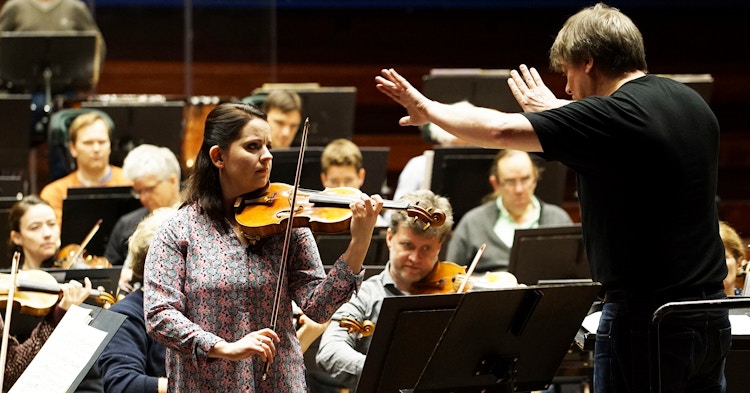− I realised how amazing these little pieces are
Strong, but not arrogant, is violinist Baiba Skride's description of her Latvian compatriots. This week she plays Sibelius pieces with the Oslo Philharmonic.
Written by Fred-Olav Vatne

Violinist Baiba Skride in rehearsal with the Oslo Philharmonic and conductor John Storgårds. (Photo: Fred-Olav Vatne/Oslo Philharmonic)
Jean Sibelius' Violin Concerto is one of the most played works in its genre, but the Six Humoresques and Two Serenades on this week's program are not heard nearly as often:
− The humoresques are almost never played as a whole, usually just one or two of them, Baiba Skride explains.
− I've done the humoresques only a few times many years ago, on my first international tour with Deutsche Kammerphilharmonie Bremen. That's how I got to know them, and I realised how amazing these little pieces are. All the essence of Sibelius is in them, they're so surprising and fascinating. Each of the humoresques has a completely different character, and they're all very interesting. Number four is basically like a dream, you can't even feel the rhythm, it's like a fantasy about something. The serenades I recorded with the Tampere Philharmonic a couple of years ago, which was also a lot of fun.
Read more about the concert and buy tickets: Sibelius and Nørgård
− We're down-to-earth people
Baiba Skride was born in Riga, Latvia, where she grew up in a musical family with two sisters who are also now musicians. Several young Latvian musicians have attained international success in later years, like conductor Andris Nelsons and singers Kristīne Opolais and Elīna Garanča, following older stars like Mariss Jansons, former chief conductor of the Oslo Philharmonic, and violinist Gidon Kremer.
− Latvians are generally very proud of anyone who manages to bring Latvia's name outside of the country. When we read about our most famous musicians performing on the most important stages in big cities, it's all very exiting. Music, along with painting, probably is the most important export we have.
She thinks her compatriots share some common characteristics:
− I think most people from Latvia are very strong, but not arrogant. If you watch Andris Nelsons conduct, and I know him very well, there is a lot of strength and knowledge and passion, but not the tiniest bit of arrogance. We're down-to-earth people, but at the same time very emotional.
− You just have to experience it!
Music is very important for Latvian people, Baiba says:
− Firstly, we're proud of our rich heritage of thousands of folk songs, both the music and the lyrics. I think that because of this singing part of Latvian culture, people are generally very musical. We feel a certain kind of togetherness because of the importance of music and of certain events − and also because the country mostly hasn't been free throughout its history.
For Norwegians considering going to Latvia on vacation, she has a strong recommendation:
− Every five years there is an amazing choir festival, with mostly Latvian choirs. In the final concert in the last festival in 2013, 17.000 singers were gathered in one concert. It's so unique and fantastic, it's difficult to describe. You just have to experience it!